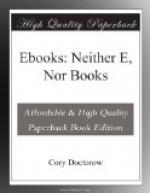* They were in languages that non-priests could read. You no longer had to take the Church’s word for it when its priests explained what God really meant
* They birthed a printing-press ecosystem in which lots of books flourished. New kinds of fiction, poetry, politics, scholarship and so on were all enabled by the printing presses whose initial popularity was spurred by Luther’s ideas about religion.
Note that all of these virtues are orthagonal to the virtues of a monkish Bible. That is, none of the things that made the Gutenberg press a success were the things that made monk-Bibles a success.
By the same token, the reasons to love ebooks have precious little to do with the reasons to love paper books.
[CHART: WHY EBOOKS KICK ASS]
* They are easy to share. Secrets of Ya-Ya Sisterhood went from a midlist title to a bestseller by being passed from hand to hand by women in reading circles. Slashdorks and other netizens have social life as rich as reading-circlites, but they don’t ever get to see each other face to face; the only kind of book they can pass from hand to hand is an ebook. What’s more, the single factor most correlated with a purchase is a recommendation from a friend — getting a book recommended by a pal is more likely to sell you on it than having read and enjoyed the preceding volume in a series!
* They are easy to slice and dice. This is where the Mac evangelist in me comes out — minority platforms matter. It’s a truism of the Napsterverse that most of the files downloaded are bog-standard top-40 tracks, like 90 percent or so, and I believe it. We all want to popular music. That’s why it’s popular. But the interesting thing is the other ten percent. Bill Gates told the New York Times that Microsoft lost the search wars by doing “a good job on the 80 percent of common queries and ignor[ing] the other stuff. But it’s the remaining 20 percent that counts, because that’s where the quality perception is.” Why did Napster captivate so many of us? Not because it could get us the top-40 tracks that we could hear just by snapping on the radio: it was because 80 percent of the music ever recorded wasn’t available for sale anywhere in the world, and in that 80 percent were all the songs that had ever touched us, all the earworms that had been lodged in our hindbrains, all the stuff that made us smile when we heard it. Those songs are different for all of us, but they share the trait of making the difference between a compelling service and, well, top-40 Clearchannel radio programming. It was the minority of tracks that appealed to the majority of us. By the same token, the malleability of electronic text means that it can be readily repurposed: you can throw it on a webserver or convert it to a format for your favorite PDA; you can ask your computer to read it aloud or you can search the text for a quotation to cite in a book report or to use in your




